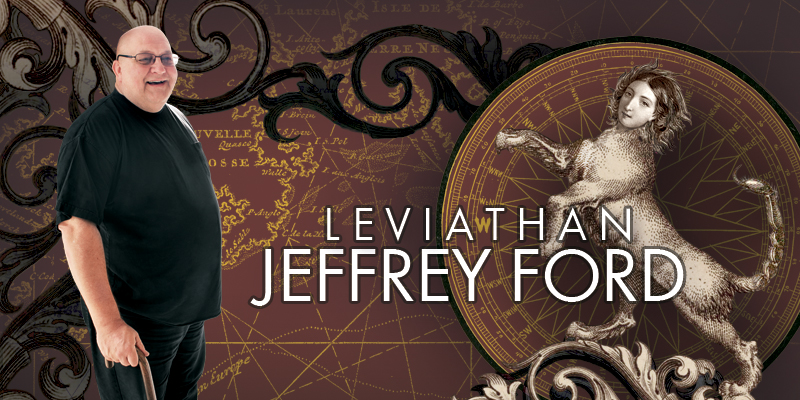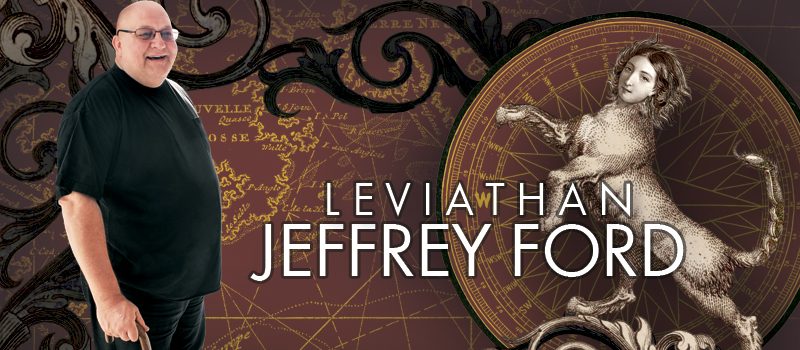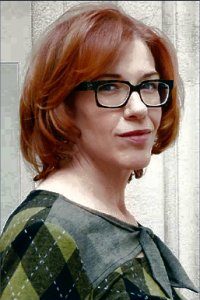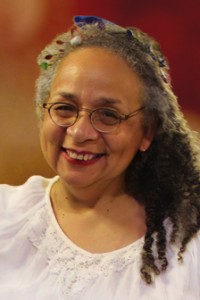Jeffrey Ford: Leviathan

Jeffrey Ford was born November 8, 1955 in West Islip NY. He flunked out of community college and took various jobs until he earned enough to buy a clam boat at age 18. He worked as a clammer for several years while writing on the side, until he decided to go back to school. He returned to the same community college, then attended New York State University, Binghamton, where he earned his BA (1979) and MA in English (1981), and studied with John Gardner, who taught fiction there. Gardner published Ford’s first story, “The Casket” (1981), and several others, in his MSS magazine. Ford studied for a PhD at Temple University in Philadelphia, but with a family to support he left in 1988 to take a tenured teaching position at Brookdale Community College, New Jersey, where he taught for over 20 years. He relocated to Ohio, and now teaches writing part time at Ohio Wesleyan University. He lives with his wife, Lynn Gallagher (married 1979). They have two adult sons, Jackson and Derek.
Excerpts from the interview:
“I wrote The Twilight Pariah for the students in my composition classes. I thought I’d write it about some kids a little older than them, focusing on that age group. It’s the closest I’ve ever come to YA. It’s not really YA, but I think it was Jonathan Strahan who said it had the structure of YA. What I really wanted to capture was their friendship – that was really the thing that interested me about it. As for the haunted part, the supernatural part, I got that idea because my buddy is a carpenter in New York and he has this place in the West Village with a backyard, and he told me one day there was an outhouse in the corner of the backyard. He started telling me about these guys in the ’50s, bottle boys, who went around and took out all the outhouses. I think they did it because the ground was unsteady there, but then they filled the holes with packed dirt. He was telling me about some of the stuff they found: like a glass eye, an old gun, dentures, anything you can imagine dropping in the bathroom. Some of it’s in a historical museum somewhere in New York. Medicine bottles. The bottle thing is big. They also found skeletons: a baby, dogs. That’s what initially gave me the idea. I did a lot of research on digging out outhouses, there’s a whole method to the madness of it. It’s a big thing, and people are really into it. I’m sure a lot of people I see doing it online are not archaeologists, just a guy with a shovel. They come up with a lot of beautiful stuff, just racks of bottles, objects they find, toys.
“The demon baby thing from Twilight Pariah – it’s like, what happens if they discover a kid skeleton, and it has horns and weird ridges on its back, and a tail? The idea has a certain Scooby Doo quality to it. Liz Hand, who did a blurb for it said, ‘Jeff, I’m not going to mention Scooby Doo.’ I realized that connection as I was doing it, and I said, ‘I’m okay with this.’
“I read a piece by Quentin Tarantino about his favorite movies, and number three on the list, which was pretty high, was Abbot and Costello Meet Frankenstein. He said, ‘I really love that movie because it’s really scary, but it’s really funny too.’ You can get that dichotomy of scary and funny, and that was something I was interested in doing in that book. The other thing I love is the mystery – there’s something so cool about being involved in a mystery. It’s consuming in a way. It’s like writing – you get consumed by it. That’s why I like mysteries. What could happen next? What is the background of this thing? I just like that sensibility.
“I don’t teach my students how to write humor in composition – I just try to get them to write. They write stories in the beginning. I start them out with narrative because it’s easier. There’s an inherent structure: beginning, middle, and end. Write me a story about something that happened to you. That’s where we start, but we quickly get into the essay. Humor has to come from the characters, and not from the writer. When you read Twilight Pariah, I think you can tell I really liked those characters. I really felt them. That’s when you can get humor out of it.
“I was thinking about when my mother passed away and my friends that I grew up with came to the funeral. I was standing in the back of the funeral home laughing so hard I was crying because they were telling me all this crazy stuff. One guy bought a candy store, but he had no air conditioning, so all of the candy was melting, and he had a fan on it. Things like that. Those stories make you laugh. Humor is always there, right around the corner. I discovered that most horror readers are not crazy about humor in their horror. I really like humor in horror.
“Jen Brehl is editing my next novel. It’s called Ahab’s Return: or, The Last Voyage. You know, like Moby-Dick; or, The Whale? ‘Ahab comes back.’ He never really dies at the end of Moby-Dick. It’s implied that he dies – the rope goes around his neck and he’s pulled overboard, and that’s the last you see of him. But in my novel, the rope comes up over his head and he gets drawn down, but the sounding of the whale draws him under – it’s not like he’s a fish on a line. The whale comes up and swallows him. He says that the last thing he thinks is he’s going to be emulsified in one of the bellies of Moby Dick and shat out from pole to pole. Ahab goes looking for Ishmael, because in my book Ishmael’s the one who wrote Moby-Dick, while working at this penny press that does outlandish stories. It’s called the Gorgon’s Mirror, and it’s a newspaper like the Weekly World News. There’s another guy who works there, George Harrow, who’s their main writer, and he makes up their stories, like, ‘The Mermaid of Harrowgate’ and ‘The Congo Homonculus’. Harrow meets Ahab, and he thinks Ahab is worth a fortune in stories. Ahab’s journey back from the Marquesas – the Gilbert Islands – where he’s picked up by the natives, and the stuff that he sees there, and his journey back, is ripe with the kind of stuff they wrote about then. Exotic places, shipwrecks – people liked to read about that stuff. Harrow gets his boss to front him money to take Ahab around, because Ahab’s not just back to find Ishmael, he’s back to find his wife and kid. They think he’s dead because they read Moby-Dick, and they moved in with an aunt in New York. He’s trying to find them, but he only knows the aunt lives on a street that’s named after a fruit. Which makes him laugh, but then Harrow thinks he’s in pain. Ahab tells him he’s forgotten how to laugh. He’s also forgotten how to cry, and when he does either one his face becomes this horrifying mess. The story is, Harrow tries to help Ahab find his wife and son. They find the aunt, and they find out the wife is dead from smallpox, and the kid has gone off to join a gang that’s into opium.
“The opium thing opens up a whole other world. John Jacob Astor made his second fortune buying opium in Turkey and selling it in China. The fur trading thing was his first fortune, but the opium really made him rich. He imported and exported tons of opium. This is a little early for when opium hits New York, which was like the 1860s. This book starts in 1853. The opium stuff really came to Chinatown in the late 1860s, but Astor had been trading it earlier. He died in 1848, so it goes back. I speculate that Astor had this warehouse full of opium in New York somewhere, and the criminals are using it to keep control of their gang. The guy who has the opium and runs the gang is anti-immigrant. This was a big thing back then – they were trying to force out the immigrants. The story’s about fake news, anti-immigration, and opioid addiction – that’s the basic idea of the story. They’re trying to get Ahab’s kid out of the clutches of this gang.
“I know Moby-Dick, I read it a couple of times, but the way this is set up, you don’t have to know Moby-Dick to understand this book. That’s so beautiful and it’s one of the things I love. The characters will talk about something that happened in the book, and Ahab will say, ‘I heard this is something that’s in the book, but it’s not what happened. This is what happened.’ Some of the novel I go along with, and some of it I change. I was going to call the book The Gorgon’s Mirror, which is the name of the magazine, but Jen was like, ‘Look, nobody knows what the hell the Gorgon’s Mirror is. Go for Ahab.'”
Interview design by Francesca Myman. Photo by Liza Groen Trombi.
Read the complete interview in the June 2018 issue of Locus.
 While you are here, please take a moment to support Locus with a one-time or recurring donation. We rely on reader donations to keep the magazine and site going, and would like to keep the site paywall free, but WE NEED YOUR FINANCIAL SUPPORT to continue quality coverage of the science fiction and fantasy field.
While you are here, please take a moment to support Locus with a one-time or recurring donation. We rely on reader donations to keep the magazine and site going, and would like to keep the site paywall free, but WE NEED YOUR FINANCIAL SUPPORT to continue quality coverage of the science fiction and fantasy field.








